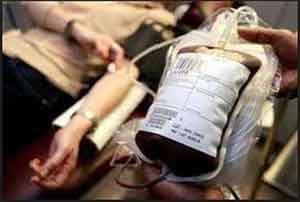- Home
- Editorial
- News
- Practice Guidelines
- Anesthesiology Guidelines
- Cancer Guidelines
- Cardiac Sciences Guidelines
- Critical Care Guidelines
- Dentistry Guidelines
- Dermatology Guidelines
- Diabetes and Endo Guidelines
- Diagnostics Guidelines
- ENT Guidelines
- Featured Practice Guidelines
- Gastroenterology Guidelines
- Geriatrics Guidelines
- Medicine Guidelines
- Nephrology Guidelines
- Neurosciences Guidelines
- Obs and Gynae Guidelines
- Ophthalmology Guidelines
- Orthopaedics Guidelines
- Paediatrics Guidelines
- Psychiatry Guidelines
- Pulmonology Guidelines
- Radiology Guidelines
- Surgery Guidelines
- Urology Guidelines
Children with severe anemia do not require immediate blood transfusion: TRACT clinical trial

Delhi: Children hospitalized for uncomplicated severe anemia do not require immediate transfusion, suggests findings from TRACT trial. The volume of transfusion may matter only in the context of fever.
The study, published in the New England Journal of Medicine, found that there was no significant difference in 28-day mortality and other clinical outcomes over 6 months in children who received transfusion versus children who did not.
The results suggest that there is no need to transfuse immediately or to transfuse a higher volume at least in the pediatric population in two sub-Saharan countries (Uganda and Malawi). The possible effect of higher volume transfusion in patients with fever may trigger additional and potentially useful studies.
Similarly, there was no significant difference in 28-day mortality among children who received transfusions of 20 mL/kg and those who received transfusions of 30 mL/kg. There was evidence to suggest a higher transfusion volume may benefit children without fevers, but this was an exploratory endpoint.
All children in the immediate-transfusion group received a transfusion, as did 386 (49.0%) in the control group. The median time to transfusion was 1.3 hours in the immediate group and 24.9 hours in the control group. The mean total blood volume transfused per child was 314 plus or minus 228 mL and 142 plus or minus 224, respectively. The follow-up period was 180 days, and 4.5% of patients (n = 71) were lost to follow-up.
Key findings:
- Death had occurred by 28 days in 7 children (0.9%) in the immediate-transfusion group and in 13 (1.7%) in the control group and by 180 days in 35 (4.5%) and 47 (6.0%), respectively, without evidence of interaction with other randomizations or evidence of between-group differences in readmissions, serious adverse events, or hemoglobin recovery at 180 days.
- The mean length of hospital stay was 0.9 days longer in the control group.
The children received a transfusion of 30 mL/kg (n = 1,592) or 20 mL/kg (n = 1,596) at a median of 1.2 hours after randomization. Some children – 197 in the 30-mL/kg group and 300 in the 20-mL/kg group – received additional transfusions. The mean volume of total blood transfused per child was 475 plus or minus 385 mL, and 353 plus or minus 348 mL, respectively.
Key findings:
- There was no significant between-group difference with regard to mortality.
- The 28-day mortality rate was 3.4% in the 30 mL/kg group and 4.5% in the 20 mL/kg group.
- The 28-day mortality rate did differ according to the presence of fever at the screening.
- The mortality rate was lower in the 30 mL/kg group for children without fevers but higher in the 30 mL/kg group for febrile children.
- For other outcomes, including readmissions and serious adverse events, the researchers found no significant between-group differences.
To read the complete study follow the link: DOI: 10.1056/NEJMoa1900105

Disclaimer: This site is primarily intended for healthcare professionals. Any content/information on this website does not replace the advice of medical and/or health professionals and should not be construed as medical/diagnostic advice/endorsement or prescription. Use of this site is subject to our terms of use, privacy policy, advertisement policy. © 2020 Minerva Medical Treatment Pvt Ltd